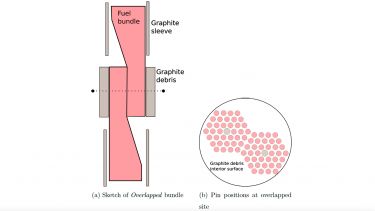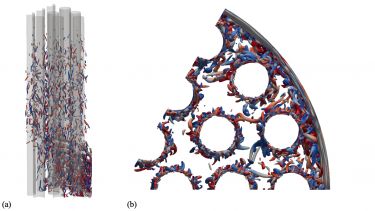AGR Fuel Route modelling
This research has been funded by EDF over a number of years since 2015 through research contracts and PhD studentships.
Researchers: Dr. Kenneth Chinembiri, Dr. Cosimo Trinca, Prof. Shuisheng He
Collaborator: Dr. Jiankang Li (EDF)
Advanced Gas-cooled reactors (AGR’s) are a British thermal reactor design developed in the early 1960s as a successor to the Magnox reactor. The fuel assemblies are cooled using Carbon dioxide, with the now heated gas transferring the captured thermal energy to the secondary circuit facilitating the generation of electrical power.
To ensure continued power generation new fuel bundles must be periodically brought online. While the depleted bundles are removed from the reactor, stored for a short duration until decay heats are permissible to allow dismantling, and then eventually transported off-site. The path the fuel takes in this journey is termed the fuel route. The extensive handling of the irradiated fuel assembly poses safety concerns due to the inherent risks. Thus, temperature predictions are required at every stage to ensure the critical temperatures of the respective components are not breached.
This research topic is concerned with the thermal-hydraulics analysis of the AGR fuel route and takes into account the different flow regimes and potential fault scenarios. For example, during the handling of the fuel assembly, there is the distinct possibility of dropping or damaging it resulting in the fragmentation of the graphite sleeve and severely distorted fuel pins. Drops in facilities where oxygen is present could also potentially lead to additional heat generation due to carbon and/or fuel oxidation.
In this research, high-fidelity methods using body-fitted meshes are used to study the detailed phenomena of the sub-systems of the fuel stringer with the complex geometric features (i.e. roughness, braces, etc) removed. While a porous medium approach is adopted to study the larger more complex system (fuel stringer) with additional features such as roughness, graphite debris, distorted fuel rods, etc. Based on the above, this research topic covers both academic and industrial aspects with the aims for each listed below.
- A study of the detailed flow phenomena and physics for AGR rod bundles using Large Eddy Simulation (LES) and Reynolds Averaged Navier Stokes (RANS) at natural circulation or forced flow conditions.
- The development, validation, and safety case application of an industrial 3-D porous model for the thermal-hydraulics analysis of the fuel route. The model is termed FREEDOM and is currently in use supporting the existing 1-D models at EDF Energy.
To achieve these aims, the open-source, co-located, and segregated Computational Fluid Dynamics (CFD) solver Code-Saturne developed by EDF is used, along with the Finite Element Analysis thermal conduction and radiation software Syrthes.
Publications
- C. Trinca, S. He, J. Li, K. Chinembiri, A Numerical Tool for the 3D Analysis of the Cooling of the AGR Fuel Stringer During Refuelling Operations, Nureth-17, 2017
- K. Chinembiri, S. He, J. Li, C. Trinca, “Numerical study of heat transfer in a distorted rod bundle”, Nuclear Engineering and Design, vol. 349, pages 63 - 77, 2019.
- K. Chinembiri, S. He, J. Li, “Natural circulation in an enclosed rod bundle of large aspect ratio”, Applied Thermal Engineering, 2021
- K. Chinembiri and S. He, “Modelling and Methodology report; FREEDOM (previously named as Postr2)”, tech. rep., FREEDOM/SHF/002, University of Sheffield, 2020.
- K. Chinembiri and S. He, “Validation report for forced and natural convection flow regimes using FREEDOM (previously named as Postr2 )” tech. rep., FREEDOM/SHF/003, University of Sheffield, 2020.
- K. Chinembiri and S. He, “FREEDOM Safety case; High carbon deposition thermal analysis for dropped fuel in the IFDF”, tech. rep., FREEDOM/SHF/004, University of Sheffield, 2020


